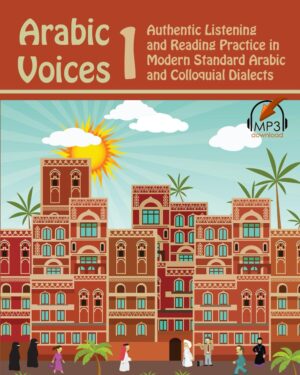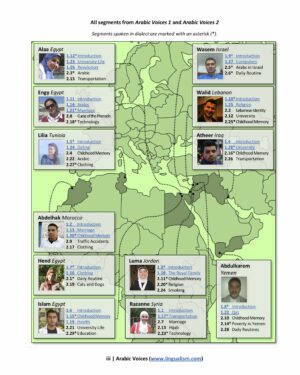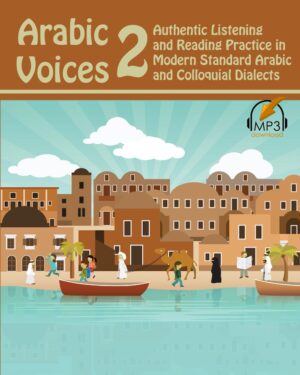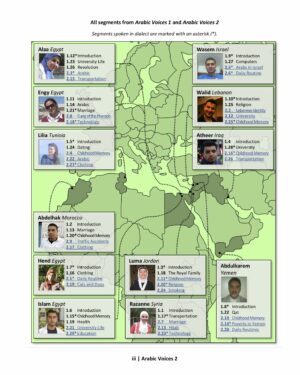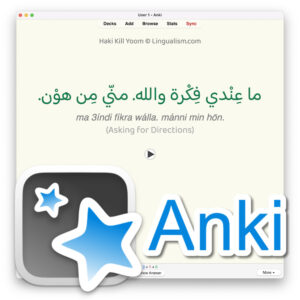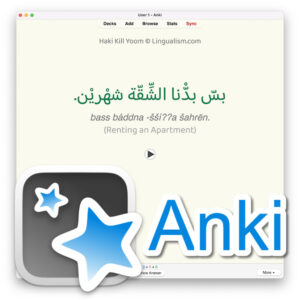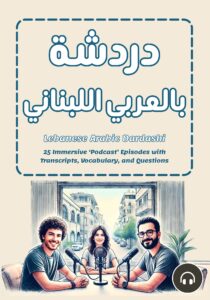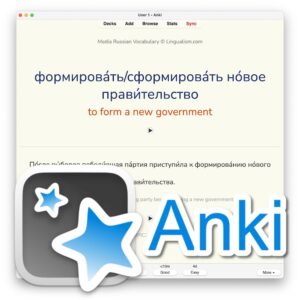Home » Modern Standard Arabic » Engy’s Self-Introduction
Engy’s Self-Introduction
| Greetings! [00:00] | السلام عليكم ورحمة الله وبركاته. | |
| Hello and welcome to a new Arabic Voices video. [00:03] | أهلاً ومرحبًا بكم في فيديو جديد من فيديوهات Arabic Voices. | |
| Today, we will comment on what Engy said about her life, what she does, and her various activities. [00:08] | اليوم سنقوم بالتعليق عمّا قالته إنجي بشأن حياتها، وما تقوم به من أعمال، ونشاطات مختلفة. | |
| We will also comment on what she said about her goals, and what she wants to do in the future. [00:18] | كما سنعلّق كذلك عمّا قالته بشأن أهدافها، وما تريد أن تفعله في المستقبل. | |
| So let's start on page 56, specifically on line 2. Engy says, "I live in the Arab Republic of Egypt in the city of Alexandria." [00:26] | فهيّا بنا نبدأ في الصفحة السادسة والخمسون، وتحديدًا في السطر الثاني. | |
| Engy says, "I live in the Arab Republic on Egypt, in Alexandria." Here, Engy uses the preposition في (in) to specify location and says, "I live in the Arab Republic of Egypt in Alexandria." [00:34] | تقول إنجي، (أعيش في جمهورية مصر العربية بمدينة الإسكندرية)، فتستخدم إنجي هنا حرف الجر [في] لتحديد المكان فتقول (أعيش في جمهورية مصر العربية)، | |
| But in the second part of the sentence, she uses another preposition that means في. She says "I live in the Arab Republic of Egypt in Alexandria." [00:51] | ولكن في الجزء الثاني من الجملة تستخدم حرف جر آخر بنفس معنى [في] – تقول (أعيش في جمهورية مصر العربية بمدينة الإسكندرية)، | |
| And here Engy uses the preposition بـ just as she used في with the same meaning. And you can... [01:05] | فتستخدم إنجي هنا حرف جرّ [الباء] مثلما استخدمت حرف جرّ [في] بنفس المعنى. ويمكنك... | |
| The preposition بِـ has different uses, and one of these usages is to be used just as the preposition في is used to designate a place. [01:19] | حرف [الباء] له إستخدامات مختلفة، وأحد هذه الإستخدامات أن يستخدم تمامًا مثلما يستخدم حرف الجر [في] لتحديد المكان. | |
| You can say, "I live in the Arab Republic of Egypt in Alexandria" or "I live in the Arab Republic of Egypt in Alexandria." [01:30] | فيمكنك أن تقول (أعيش في جمهورية مصر العربية بمدينة الإسكندرية)، (أعيش في جمهورية مصر العربية في مدينة الإسكندرية)؛ | |
| في the city of Alexandria; بـ the city of Alexandria. Both are correct; the meaning here is the same. [01:41] | في مدينة الإسكندرية، بمدينة الإسكندرية—كلاهما صحيح، فالمعنى هنا واحد. | |
| You could say I study in the library or I study in the library. Both are correct, في or بـ are synonyms to determine where you perform an action. [01:49] | يمكنك أن تقول أنا أدرس في المكتبة، أنا أدرس بالمكتبة—كلاهما صحيح، [في والباء] بمعنًا واحد لتحديد المكان الذي تقوم فيه بأداء فعل ما. | |
| This is the first point about what Engy said. [02:08] | فهذه هي النقطة الأولى بشأن ما قالته إنجي. | |
| And we move on to the second point, which is about what Engy said specifically on line 6. [02:17] | وننتقل إلى النقطة الثانية، وهي بشأن ما قالته إنجي تحديدًا في السطر السادس. | |
| Engy says, "I love my job very much and really enjoy doing it." Engy uses two words here, both of which are also used... [02:28] | تقول إنجي، (أحب مهنتي كثيرًا وأستمتع جدًا بأدائها)، تستخدم إنجي هنا كلمتين، وكلاهما أيضًا يستخدمان... | |
| They are used in the same sense: I love my profession a lot, and I enjoy very much. [02:41] | يستخدمان بمعنا واحد (أحب مهنتي كثيرًا) و(أستمتع جدًا). | |
| كثيرًا and جدًا. Both mean that you do this very much or you really like this thing. [02:49] | [كثيرًا وجدًا]—كلاهما يعني أنك تقوم بأداء هذا الشيء لدرجة كبيرة أو تحبّ هذا الشيء لدرجة كبيرة. | |
| For example, she does not just say 'I love my job,' but she loves her profession 'very much'; To emphasize, use the word كثيرًا or use the word جدًا. Both have the same meaning. [02:59] | فمثلًا هي لا تقول أحب مهنتي وفقط، ولكنها تحب مهنتها كثيرًا؛ للمبالغة تستخدم كلمة [كثيرًا] أو تستخدم كلمة [جدًا]—كلاهما بمعنى الواحد. | |
| You could also say 'I love my job very much,' and 'I enjoy doing it very much.' It's the same. [03:16] | يمكنك كذلك أن تقول أحب مهنتي جدًا، وأستمتع كثيرًا بأدائها، [جدًا—كثيرًا] بمعنى الواحد. | |
| There is also another word that Engy uses later, and it is the word للغاية (extremely). [03:25] | كذلك هناك كلمة أخرى تستخدمها إنجي لاحقًا وهي كلمة [للغاية]. | |
| They all mean you love this thing very, very much. [03:32] | كثيرًا، جدًا، للغاية—كل منهم يعني أنك تحب هذا الشيء لدرجة كبيرة جدًا. | |
| These words are used to emphasize. 'I love my profession very much.' [03:43] | تستخدم هذه الكلمات للمبالغة أحب مهنتي كثيرًا، أحب مهنتي جدًا أحب مهنتي للغاية. | |
| Great! So let's move on to the line 8. Engy says, "As for my hobbies, I like reading, especially reading novels." [03:58] | عظيم! هيّا بنا ننتقل إذًا إلى السطر الثامن—تقول إنجي، (أما عن هواياتي فأنا أحب القراءة وخاصّةً قراءة الروايات). | |
| Here, Engy identifies different hobbies she likes and uses the word وخاصّةً. [04:15] | هنا تقوم إنجي بتحديد ما تحبه من هوايات مختلفة فتستخدم كلمة [وخاصّةً]. | |
| This word means 'specifically.' The word وخاصّةً or خاصّةً is used to specify something. [04:27] | كلمة [وخاصّةً] تعني تحديدًا، وبالتحديد، فكلمة [خاصّةً أو وخاصّةً] تستخدم لتحديد شيء ما. | |
| I like different sports, especially football; I like different languages, especially Arabic, and so on. The word is used to identify a specific thing. [04:41] | أنا أحبّ الرياضات المختلفة وخاصّةً كرة القدم، أحب اللّغات المختلفة وخاصةً اللّغة العربية، وهكذا؛ فكلمة [وخاصّةً] تستخدم لتحديد شيء بعينه. | |
| Great! So let's move on to the next point, which is about what Engy said line 14. [05:01] | عظيم! هيّا إذًا ننتقل إلى النقطة التالية، وهي بشأن ما قالته إنجي في السطر الرابع عشر. | |
| Engy says, "I have visited almost all archaeological sites in Egypt from different eras." [05:16] | تقول إنجي، (وقد زرت تقريبًا كل الأماكن الأثرية في مصر من مختلف العصور). | |
| Here, Engy uses the word كل to indicate that she has visited all the places that... archaeological sites in Egypt, [05:25] | تستخدم إنجي هنا كلمة [كل] لتشير أنها قامت بزيارة جميع الأماكن التي... الأماكن الأثرية في مصر، | |
| but here Engy puts the word تقريبًا (almost) before the word كل: 'almost all places,' and this... [05:37] | ولكن تسبق إنجي هنا كلمة [كل] بكلمة [تقريبًا]، تقريبًا كل الأماكن، وهذا... | |
| And the word تقريبًا here specifies that she has not visited ALL places; she has not visited all places, but almost all places. [05:47] | وكلمة [تقريبًا] هناتحدّد أنها لم تزر كل الأماكن، لم تزر جميع الأماكن، ولكنها تقريبًا زارت كل الأماكن. | |
| Perhaps it means you did not visit one or two places, but you visited all the rest of the archaeological sites in Egypt. [05:57] | ربما يعني لم تزر مكان أو إثنين، ولكن زارت باقي الأماكن الأثرية كلها في مصر. | |
| As explained in the book, the word كل is used to indicate that you are doing... [06:07] | وكما هو مشروح بالكتاب، كلمة [كل] تستخدم للإشارة إلى أنّك تقوم... | |
| ... to refer to all individuals or all things in a place, [06:15] | إلى الإشارة إلى جميع الأفراد أو جميع الأشياء في مكان ما، | |
| but here Engy uses the word تقريبًا before it to specify that she has not visited every place but most places, perhaps not one or two, but most places.... [06:22] | ولكن هنا تستخدم إنجي كلمة [تقريبًا] قبلها لتحدد أنها لم تزر كل مكان ولكنها زارت معظم الأماكن، لم تزر ربما مكان أو إثنين، ولكنها زارت معظم الأماكن. | |
| Great! So we move on to the next point, which is about what Engy said on line 21. [06:40] | عظيم! ننتقل إذّا إلى النقطة التالية وهي بشأنما قالته إنجي في السطر الواحد والعشرون. | |
| Engy talks on line 21 about non-governmental organizations—which aim to help youth and help society. [06:57] | تقول إنجي في السطر الواحد والعشرون عن الجمعيات غير الحكومية—والتي تهدف إلى مساعدة الشباب ومساعدة المجتمع. | |
| and while talking about goals. Engy uses different words or different derivations of the word 'goal' to talk about their goals. [07:11] | وأثناء الحديث عن الأهداف تستخدم إنجي كلمات مختلفة أو اشتقاقات مختلفة من كلمة هدف للحديث عن أهدافها. | |
| She uses the verb 'aims.' She uses the noun, which is 'goal' or 'goals,' and we will identify each of them during her speech in... [07:24] | فهي تستخدم الفعل [يهدف] أو [تهدف إلى] تستخدم الاسم وهو [هدف] أو [أهداف] وسنقوم بتحديد كل منهما أثناء حديثها في... | |
| ... about the future and what she wants to do. [07:38] | عن المستقبل وما تريد أن تفعله. | |
| If we look at the rest of the talk, Engy uses the word 'target' on line 23... line 27 [07:42] | إذا نظرنا إلى باقي الحديث تستخدم إنجي كلمة [تهدف] في السطر الثالث والعشرون... السابع والعشرون | |
| She uses the noun هدف (goal). "I have volunteered in a large number of projects that serve this goal." [07:51] | تستخدم الاسم [هدف]، (وقد تطوعت في عدد كبير من المشروعات التي تخدم هذا الهدف). | |
| الهدف and الغاية ل both have the same meaning, and here you use the noun from the verb هدف (to aim). [08:00] | [الهدف، الغاية] كلاهما بمعنا واحد وهنا تستخدم الاسم من الفعل هدف أو يهدف. | |
| She uses the plural on line 30, and says, "As for my goals," and this is the plural form—another derivation of the same word—and the word 'goal' is used again on line 31. [08:13] | تستخدم الجمع في السطر الثلاثون وتقول، (أما عن أهدافي) وهذه صيغة الجمع—إشتقاق آخر من نفس الكلمة—وتستخدم كلمة هدف مرة أخرى في السطر الواحد والثلاثون. | |
| So here she uses the word goal or goals; she uses different derivations. She uses the verb, she uses the noun, and she uses the plural of this noun to mean an end she wants to achieve. [08:31] | فتستخدم هنا كلمة هدف أو أهداف، تستخدم اشتقاقات مختلفة، تستخدم الفعل، تستخدم الاسم، وتستخدم الجمع من هذا الاسم كلمة [هدف] بمعنى غاية تريد تحقيقها. | |
| Great! Finally, we'll talk about what Engy said on line 23. I'm taking you back to line 23. [08:48] | عظيم! أخيرًا نتكلم عمّا قالته إنجي في السطر الثالث والعشرون. آخذكم مرّة أخرى إلى السطر الثالث والعشرون. | |
| Engy explains here... One thing, she's explaining non-formal education and she uses the phrase عبارة عن. [09:02] | تقوم إنجي هنا بشرح... أمرٍ ما، هي تقوم بشرح التعليم غير الرسمي وتستخدم مصطلح [عبارة عن]. | |
| The term عبارة عن is used to describe a thing, concept, entity, or anything. [09:17] | مصطلح [عبارة عن] هو ويستخدم لشرح أمرٍ ما، أو مفهومٍ ما، أو كيانٍ ما، أو شيءٍ ما. | |
| If you want to explain something, define it, you can use the term... عبارة عن [09:26] | إذا أردت أن تشرح أمرٍ ما، تقوم بتعريف هذا الشيء يمكنك أن تستخدم المصطلح ... [عبارة عن]؛ | |
| Engy says here, "Non-formal education is a set of educational activities aimed at educating young people." [09:37] | فتقول إنجي هنا: (هو التعليم غير الرسمي وهو عبارة عن مجموعة من الأنشطة التثقيفية التيتهدف إلى تعليم الشباب). | |
| The phrase is used to explain something or a concept. [09:51] | تستخدم مصطلح [عبارة عن] لشرح أمرٍ ما أو مفهومٍ ما. | |
| For example, you can say, "This book is an explanation of the different grammatical rules, different terms, and...the different concepts in the Arabic language." [09:58] | يمكنك مثلًا أن تقول: هذا الكتاب هو عبارة عن شرح للقواعد النحوية المختلفة والمصطلحات المختلفة و...والمفاهيم المختلفة في اللغة العربية. | |
| عبارة عن. Use this term to give a definition, or to explain something, or a term, or a concept. [10:15] | [عبارة عن] استخدم هذا المصطلح لإعطاء تعريف ما، أو شرح أمرٍ ما، أو مصطلحٍ ما، أو مفهومٍ ما. | |
| With this, we have finished commenting on what Engy said about her life in Egypt and explaining the different terms she used during her speech. [10:27] | وبهذا نكون قد انتهينا من التّعليق عمّا قالته إنجي بشأن حياتها في مصر، وشرح المصطلحات المختلفة التّي استخدمتها أثناء حديثها. | |
| I hope you have benefited from this video. [10:38] | أتمنى أن تكونوا قد استفدتم من هذا الفيديو. | |
| Thank you very much, and see you again, God willing, with commentary on another discussion of what Arabic speakers said in the book Arabic Voices. [10:42] | أشكركم شكرًا جزيلًا و ألقاكم مرة أخرى بإذن الله مع التعليق علىحديث آخر مما قاله متحدّثو اللغة العربية في كتاب ِArabic Voices. | |
| Until next time, take care, and may the peace, mercy and blessings of God be upon you. [10:54] | إلى لقاءٍ آخر، ألقاكم على خير، والسلام عليكم ورحمة الله وبركاته. |
Video Lessons
Arabic Voices MSA Lessons
Arabic teacher Mostafa Ahmed takes us through segments in MSA from Lingualism's book Arabic Voices 1: Authentic Listening and Reading Practice in Modern Standard Arabic and Colloquial Dialects, explaining interesting points of grammar and vocabulary.

